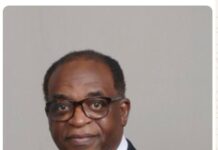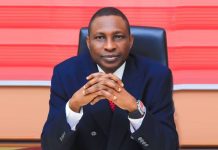 There were two events of note in Nigeria’s media world last week. One was a virtual National Conference called by Leadership Newspapers at Abuja last Tuesday while the other was the Public Presentation of Blueprint at Abuja on Thursday. It is heart warming that in spite of the declining fortune of newspaper publishing globally, a number of them in Nigeria are not only surviving but also creating platforms for interrogating Nigeria. At this rate, the world of newspaper publishing may have a lot to learn from Nigerian publishers on survival of newspapers in time of acute competition from television and the more instantaneous and interactive social media, terrible decline in readership in favour of viewership, dearth of journalists with the interpretative depth and narrative elegance capable of attracting and retaining readers and, in Africa, the high cost of the technological infrastructure underpinning modern printing.
There were two events of note in Nigeria’s media world last week. One was a virtual National Conference called by Leadership Newspapers at Abuja last Tuesday while the other was the Public Presentation of Blueprint at Abuja on Thursday. It is heart warming that in spite of the declining fortune of newspaper publishing globally, a number of them in Nigeria are not only surviving but also creating platforms for interrogating Nigeria. At this rate, the world of newspaper publishing may have a lot to learn from Nigerian publishers on survival of newspapers in time of acute competition from television and the more instantaneous and interactive social media, terrible decline in readership in favour of viewership, dearth of journalists with the interpretative depth and narrative elegance capable of attracting and retaining readers and, in Africa, the high cost of the technological infrastructure underpinning modern printing.
Common to both occasions is the irony of the leadership of military intellectuals in the interrogation of Nigeria. While General Theophilus Danjuma stole the show at the Leadership Newspapers’ ‘National Conference” with his coup against the governors whom he declared to be too powerful for the health of democracy, General Babangida did so with his postulations on ‘Development and Economic Growth in a Multicultural Society’ at the Public Presentation of Blueprint. It is interesting that military intellectuals are soaring at a time there is virtually nothing like intellectualism in the civil society, particularly among politicians and even the academia. Thank God, former Vice-President Atiku Abubakar and Senator Tinubu diluted the military take-over with their surprising interventions in favour of return to regions as a way of reducing over concentration of powers in the president and scrapping of the Senate respectively. Surprising is a mild word to use when a former Vice-President of the Federal Republic and perhaps a future president suddenly seeks miniaturization of the office.
Still, it is difficult to disagree with people like Atiku, Tinubu or Danjuma because they have seen it all. Danjuma, in particular, is a man who does his homework, who still reads and whose warnings rarely fail to come true. He warned Nigeria in 1978 against falling into the religious conflict trap. Today, Nigeria is facing a security challenge of a religious face.
So, given his consistent concern with instability from a self evidently philanthropic concern of a statesman, it is time to enjoin him to change the direction of his intervention. Now, what do I mean by that? Let us take his analysis that part of the problem is the over lordship of governors. I am not a governor, I have no plans to be a governor and I don’t have a contract from any governor or governors to open a defence for him or them. But I know that the problem is not the over lordship of the governors but the quality of materials who make it into governorship in Nigeria.
A society cannot allow a smuggler, ex-convicts, practiced swingers or desperadoes into office as governors or senators or LGC Chairmen and expect anything better from such collection. This is a simple in-put/out-put analysis. In this context, there are good and bad people and the society must do something to stop the bad people in favour of the good people. It is not democracy or equal opportunity to allow bad people to contest elections because democracy is not madness. It is not democracy or equal opportunity to fail to inhibit the bad guy from getting that office because that is like saying that two drivers, one of them drunk, should all be allowed to drive simply because they all have driving licenses. How can you say a bad guy should be given equal opportunity with a good guy when we can determine who is good and who is bad by a simple background check?
Checking and stopping the bad guy is the task people like Danjuma and his ilks can help the society because the society cannot help itself again. This would be more helpful than trying to dismantle existing structures or re-configuring the country into regions, something which the incumbent governors and senators will certainly block because they won’t sit by and watch themselves being decreed out of existence. Atiku or Danjuma would be shocked by the instability that rendering so many governors and potential governors redundant, particularly those who have tasted powers, will generate.
Nigeria’s level of development today is such that we need even more powerful governors provided we get the right materials with the value orientation which can energize and supervise a developmental leap, the core of which would be the lifting of the human resources support base of the states. Truth is that most states in Nigeria do not have the human resources to run any of the democratic institutions like the state Houses of assembly or the local government councils if left without a profoundly democratic guardian like a quality governor. Most of those who vie for election into these two institutions have no elementary ideas of democracy in any sense of it, not to talk of operationalising them. Even a determined governor in Nigeria today would have problem with his bureaucracy because that institution has degenerated to where writing memo is a problem in many states.
Getting this type of governors may sound like a dream only because of the Nigerian society of today. Otherwise, we had them in the 1979 -1983 set of governors. Anyone you mentioned among them had a track record whether it is Solomon Lar aka emancipator in Plateau then, Bola Ige aka Cicero of Agodi in Ibadan, Lateef Jakande in Lagos whose municipal rail project would have been truly transformative, Balarabe Musa and his yet to be matched agricultural and rural industrialization plans in Kaduna, Rimi and ‘cangi dole’ in Kano, Garba Nadama in Sokoto with a PhD in History before he joined politics and so on. If Danjuma and people like him change their direction of intervention and get more forcefully involved, Nigeria can still replicate 1979 EITHER from those who have all but advanced to be recognized for 2015 such as Atiku Abubakar, Babangida Aliyu, General Buhari, Goodluck Jonathan, Sule Lamido, David Mark, Namadi Sambo, Isa Yuguda, Murtala Nyako OR those who have been speculated like General Gusau, Okonjo-Iweala, CBN Governor OR others who have not been speculated but exist.
Even at my small level, I can think of two of such immediately. Former governor of Kaduna State, Ahmed Makarfi certainly made a statement in the systematic management of diversity in Nigeria. When we consider the unproductive so-called ethnic violence across the country now, Makarfi’s is comparable to a British ambassador to the defunct USSR penetrating the Kremlin. It automatically entitles him to be considered the next Prime Minister. But here, we are a society always leaving the saints in favour of the devils.
Similarly, Jerry Gana made a statement on democratisation in Nigeria by beating a more entrenched opponent when he entered politics as a poor Professor of Geography in 1983. A year earlier, he had also asked in Kano: The critical question that arises, especially within the context of the Nigerian state is whether capitalist democracy would respect its own legal order in case of an electoral triumph for socialism. In other words, if the progressives in Nigeria were to win a decisive victory at the polls against the reactionary forces, would such forces not revert to illegal and unconstitutional means to defend their interest? He got the answer subsequently. He won a decisive victory at the polls in August 1983 but the Buhari coup sent him packing from the Senate in December 1983. In 1993, Abiola won free and square, according to party mandarin, Adamu Ciroma but was incinerated in junta politics. So, to date, Jerry Gana posed the most profound question for democratisation in Nigeria: the right and left wing divide and the rascality of the right wing in Nigeria.
I don’t know Jerry Gana well and cannot say anything about his capacity for decisiveness. Although he has track record, public spiritedness, oratory, ability and integrity, (in so far as he is not a billionaire by now although he has been close to many powerful individuals like IBB, General Abdulsalami, OBJ and Danjuma himself), I think he is too gentle. But if he could identify and pose the most fundamental question in our democratisation, he could equally pose a question such as why has the Chinese power elite, for example, been able to feed China’s population of nearly a billion and half while we have not been able to feed ours of less than 200 million Nigerians, which is still less than the population of the Indian state of Uttar Pradesh? Rather, in the year 2012, our greatest achievement in Agriculture is cassava bread.
General Danjuma must know many more quality people around than I can ever do and whom, with the collaboration of other democratic stakeholders, he can ‘impose’ on Nigeria democratically so that a re-naissance can replace lamentation. In the absence of practiced revolutionary parties and organisations that can manage popular uprising in Nigeria today from being hijacked by separatist forces, anarchists and free lance radicals, we need some members of the wasteful and wasted generation like General Danjuma to come together and save the Blackman from the catastrophe of Nigeria imploding from injuries inflicted on it by a historically clueless state. Otherwise, we would remain global second class citizens in an age of research, reverse engineering, cultural and information warfare. This is the point about change of direction by the Danjumas of Nigeria today.
ONOJA writes for Blueprint



